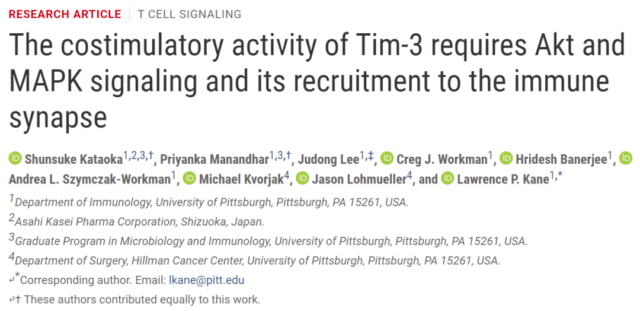Targeting TIM-3 can restore the anti-cancer activity of T cells
- Normal Liver Cells Found to Promote Cancer Metastasis to the Liver
- Nearly 80% Complete Remission: Breakthrough in ADC Anti-Tumor Treatment
- Vaccination Against Common Diseases May Prevent Dementia!
- New Alzheimer’s Disease (AD) Diagnosis and Staging Criteria
- Breakthrough in Alzheimer’s Disease: New Nasal Spray Halts Cognitive Decline by Targeting Toxic Protein
- Can the Tap Water at the Paris Olympics be Drunk Directly?
Targeting TIM-3 can restore the anti-cancer activity of T cells
Targeting TIM-3 can restore the anti-cancer activity of T cells. TIM-3 is a marker of T cell exhaustion. Targeting TIM-3 can restore the anti-cancer activity of T cells
Tim-3, a key protein on the surface of T cells, can be used as a marker of T cell exhaustion. More importantly, Tim-3 can also be used as a therapeutic target for restoring T cell viability. It can be restored by targeting Tim-3 with drugs. The vitality of T cells allows them to continue to fight pathogens or tumor cells.
Marathon runners after running 42 kilometers, bushes under the scorching sun, birds flying for a day, and shepherd dogs after a day of work are all exhausted at this time, and exhaustion is an inevitable thing in life.
T cells, the main force of the human immune system, are also unable to inevitably experience fatigue. More and more researchers are turning their attention to this extraordinary phenomenon-T Cell Exhaustion. After fighting bacteria, viruses or tumor cells, T cells are exhausted and can no longer continue to fight.
We all know that people can rejuvenate themselves by supplementing energy after exhaustion, so is there a way to rejuvenate T cells and continue fighting?
Recently, researchers from the University of Pittsburgh in the United States published a research paper titled: The costimulatory activity of Tim-3 requires Akt and MAPK signaling and its recruitment to the immune synapse in Science Signaling, which was also selected as Cover paper of the current issue.
The study found that Tim-3, a key protein on the surface of T cells, can be used as a marker of T cell exhaustion. More importantly, Tim-3 can also be used as a therapeutic target for restoring T cell viability. Tim-3 is targeted by drugs. 3 It can restore the vitality of T cells so that they can continue to fight pathogens or tumor cells.


As early as 1993, scientists observed that persistent viral infections would lead to T cell depletion, and later discovered that tumor cells could also lead to T cell depletion.
T Cell Exhaustion refers to T cell dysfunction caused by chronic antigen stimulation. Antigens are proteins derived from pathogens such as bacteria or viruses, or tumor cells. They are recognized by healthy T cells as dangerous foreign objects. They are also the inducement for T cells to go all out to initiate an immune response to eliminate the threat.
This powerful and continuous response of T cells may also lead to serious consequences. T cells recognize and respond to antigens through T Cell Receptors (TCR), but if the antigen persists, it will Excessive stimulation of T cell receptors (TCR) disrupts T cell signal transduction and exhausts TCR’s ability to effectively respond to threats.
In this study, the research team conducted an in-depth study of T cell depletion and found that the transmembrane protein Tim3 experienced a large increase in the surface of depleted T cells after chronic antigen stimulation, including chronic infections and solid tumors. Therefore, the research team believes that Tim-3 can be used as a marker of T cell exhaustion, and that the increase in Tim-3 may inhibit the activation of T cells.
The research team observed through a variety of microscopic techniques such as confocal microscopy and found that Tim-3 was recruited to the T cell immune synapse, which is the key contact point between T cells and antigen presenting cells, leading to the downstream of the T cell receptor (TCR) Signal enhancement.
Therefore, Tim-3 may be a target for restoring T cell viability, and targeted inhibition of Tim-3 is expected to restore T cell activity, thereby restoring the ability of T cells to fight pathogens and tumor cells.
(source:internet, reference only)
Disclaimer of medicaltrend.org
Important Note: The information provided is for informational purposes only and should not be considered as medical advice.



